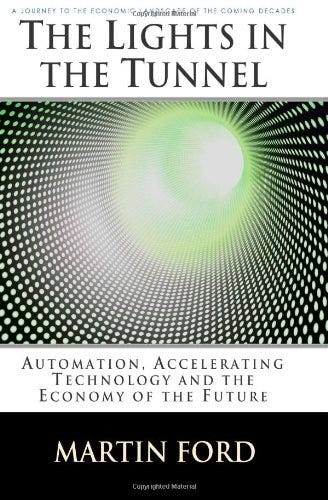From the Archives: Occupational Hazards
Republishing verbatim an essay I wrote on an old Weebly account on July 7, 2011... 14 years ago. It's just as relevant today, if not eerily more so...
I’ve been growing more and more curious over the years as to how technology can continue to become more advanced and sophisticated, making the world safer, smaller, smarter, faster, and more efficient, and yet not have a drastic effect on the global labor market.
In the wake of the “Great Recession” which led to millions of people losing their jobs, I couldn’t help but wonder if some companies used the economic calamity as an “excuse” to eliminate unnecessary positions. A company’s workforce can be like a big family, and social connections between employees on all levels can be quite strong. It can’t be easy laying people off. I can’t imagine managers not having a difficult time explaining to an employee that his or her services will no longer be needed because of something beyond their control, such as the company deciding to close a certain department or that they’ve been replaced by a computer program or other automated process. News like that from the employee’s perspective would be difficult to respond to with anything other than anger, confusion, and disgust towards the company’s management, immediately assuming the company is choosing profits over relationships and loyalty.
However, in the wake of an economic disaster, a credit freeze, or extremely poor business outlook, such news may not come as such a surprise to some employees who may see it coming, or at least formulate an understanding as to why layoffs were necessary. In that case, a laid off employee may not focus all of his or her anger towards the company, but rather towards the economic situation itself or even the people or organizations deemed responsible for the collapse, like the banks for instance. Regardless of the true motives behind some layoffs, employees may believe their employers have no choice, that they and the company are in the same boat in the volatile waves of economic uncertainty. Some companies have to know this and thus use it to their advantage to displace the uproar.
I'm sure many companies involved in the shedding of work forces over the past few years shrank their payrolls out of necessity and then became leaner and more efficient, but others that may have been in much better shape financially, might have used the recession as an “everybody’s doing it” excuse to eliminate employees they had been thinking of laying off for years, held back only by the prospect of bad press from laying off workers in a positive business environment. A company doesn't just realize that it can automate a process or hire a robot and then turn around and lay off employees overnight. A company waits for the right time and the recession was certainly one of those times.
So will those same jobs come back, or will new jobs in new industries emerge? It will be interesting to watch. In response to my curiosity, I sought out some reading material and came across the book “The Lights In The Tunnel” by Martin Ford. It discusses the future of the global labor market and the potential clash between the effects of accelerating technology and the tried and true foundations of global economic theory. It’s a very interesting read that solidified many of my thoughts and opinions on the subject and really got me thinking about a future we’ll all be a part of sooner rather than later.



